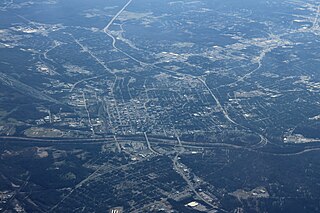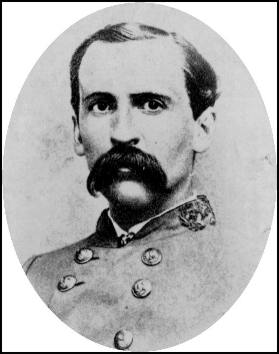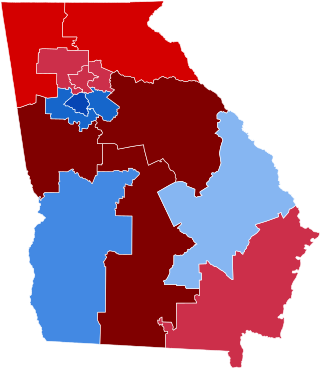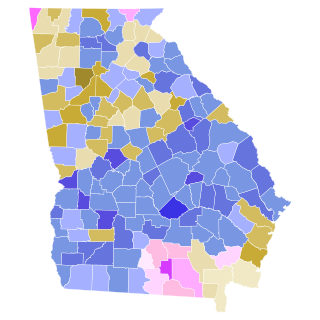
Eufaula is the largest city in Barbour County, Alabama, United States. As of the 2010 census the city's population was 13,137.

Macon, officially Macon–Bibb County, is a consolidated city-county in Georgia, United States. Situated near the fall line of the Ocmulgee River, it is 85 miles (137 km) southeast of Atlanta and near the state's geographic center—hence its nickname "The Heart of Georgia".

The 2006 Georgia gubernatorial election was held on November 7, 2006. Georgia incumbent Republican governor Sonny Perdue ran for re-election to a second and final term as governor. Governor Perdue was renominated by the Republican Party, defeating a minor opponent in the process, while Lieutenant Governor Mark Taylor narrowly emerged victorious from a competitive Democratic primary. In the general election, though Taylor ran a spirited campaign, Perdue was aided by the increasing tendency of the state to vote for Republicans and by his popularity with the public; polling showed his approval ratings above sixty percent. In the end, Perdue was overwhelmingly re-elected as governor, defeating Taylor in a landslide, becoming the first Republican Governor of Georgia to ever be reelected. As of 2024, this is the last time that Muscogee, Warren, Rockdale, Chatham, and Bibb counties voted for the Republican candidate for governor and the last time that Marion, Telfair, and Wheeler counties voted for the Democratic candidate.

The Telegraph, frequently called The Macon Telegraph, is the primary print news organ in Middle Georgia. It is the third-largest newspaper in the State of Georgia. Founded in 1826, The Telegraph has undergone several name changes, mergers, and publishers. As of June 2006, the paper is owned by The McClatchy Company, a publicly traded American publishing company.
The Wrightsville and Tennille Railroad (W&T) was chartered in 1883 with the purpose of building a connection with the Central of Georgia Railroad at Tennille, GA to Wrightsville, GA. The line started construction, and by March 1884, 1.5 miles had been completed, however grading work was delayed at that time by heavy rains. In April 1884, they acknowledged the use of convict lease labor for the construction of the rail line, citing that there were 43 men that were working on the line. By June of 1884, 2.5 miles had been completed, and an additional 3.5 miles had been graded, the average cost was cited as $1,200-$1,500 a mile. Later that same year, in a push to build the line faster, 80 additional men who were part of the convict lease labor force at the farm of Honorable J M Smith of Oglethorpe were sent to work on the line for 40 days. The line was completed in March1885, and in May 1885 there were over 1,700 ticketed passengers on the line. Prices had been posted in February 1885 which cited each passenger's cost at 4 cents per mile.

Robert Houstoun Anderson was a West Point graduate, an infantry officer in the United States Army and served as a Brigadier General in the Confederate States Army during the American Civil War. After the war he served as the Chief of Police for the city of Savannah for 23 years and was twice appointed to serve on the Visitor's Board of the United States Military Academy at West Point, New York. With General Wheeler, General Anderson played an important role in reunification, recommending improvements and changes at West Point like electricity and the telephone in 1887.

The 1966 Georgia gubernatorial election was held on November 8, 1966. After an election that exposed divisions within the Georgia Democratic Party, segregationist Democrat Lester Maddox was elected Governor of Georgia. The voting also brought future President Jimmy Carter to statewide prominence for the first time. The election was the closest in Georgia gubernatorial history; Republican candidate Bo Callaway won a plurality of the popular vote, but lost the contingent election in the Georgia General Assembly to Maddox. It was also the first time since 1916 that the Republican Party contested a gubernatorial election. If Callaway had won the contingent election or a majority of the popular vote, he would have become the only Republican governor of Georgia in the 20th century.

The Macon and Brunswick Railroad ran from Macon, Georgia to Brunswick, Georgia. Its construction was interrupted by the American Civil War, and initially only ran from Macon to Cochran, Georgia. The 5 ft gauge line was completed and extended to the Georgia coast when it opened in its entirety in December 1869. Construction of the line stimulated the lumber industry along its path, and the founding of new towns and counties.

The 2012 United States House of Representatives elections in Georgia were held on Tuesday, November 6, 2012, and elected the 14 U.S. Representatives from the state, one from each of the state's 14 congressional districts, an increase of one seat following the 2010 United States census. The elections coincided with the elections of other federal and state offices, including a quadrennial presidential election. The party primary elections were held on July 31, 2012, and the run-off on August 21, 2012.

Terminal Station, Macon, Georgia, is a railroad station that was built in 1916, and is located on 5th St. at the end of Cherry St. It was designed in the Beaux-Arts style by architect Alfred T. Fellheimer (1875–1959), prominent for his design of Grand Central Terminal in New York City in 1903. The station building is part of the Macon Historic District, which is listed on the National Register of Historic Places. While no longer an active train station, it has been the location of the Macon Transit Authority bus hub since 2014.

The 1974 Georgia gubernatorial election was held on November 5, 1974. Under Georgia's constitution at the time, incumbent Democratic governor Jimmy Carter was ineligible to serve a second consecutive term. He was elected President of the United States in the 1976 presidential election. George Busbee was elected as the 77th Governor of Georgia.
The following is a timeline of the history of the city of Macon, Georgia, United States.

The 1946 Georgia gubernatorial election took place on November 5, 1946, in order to elect the governor of Georgia.

Mary Ann Williams was an American woman who was the first proponent for Memorial Day, an annual holiday to decorate soldiers’ graves.

United States gubernatorial elections were held in 1894, in 28 states, concurrent with the House and Senate elections, on November 6, 1894.

The 1890 Tennessee gubernatorial election was held on November 4, 1890. Incumbent Democratic Governor Robert Love Taylor did not seek re-election. Democratic nominee John P. Buchanan defeated Republican nominee Lewis T. Baxter and Prohibition nominee D. C. Kelley with 56.57% of the vote.

The 1823 New Hampshire gubernatorial election was held on March 11, 1823.

Andrew J. Orr and Dickinson W. Orr, typically advertising as A. J. & D. W. Orr, were brothers, merchants, planters, railroad contractors, and slave traders based in Macon, Georgia, United States. The Orrs were originally from the Charlotte, North Carolina area, but moved to central Georgia early in their lives and remained there, first working as local merchants and then transitioning into the interstate slave trade, buying in the Carolinas and Richmond, Virginia, and selling to planters in the vicinity of Macon and Augusta, Georgia. They then became railroad contractors as well, using groups of enslaved men to build three separate Georgia railroad lines. A. J. Orr was beaten to death by a slave in 1855. D. W. Orr continued working as a railroad contractor until at least 1863. He died in 1867.


















